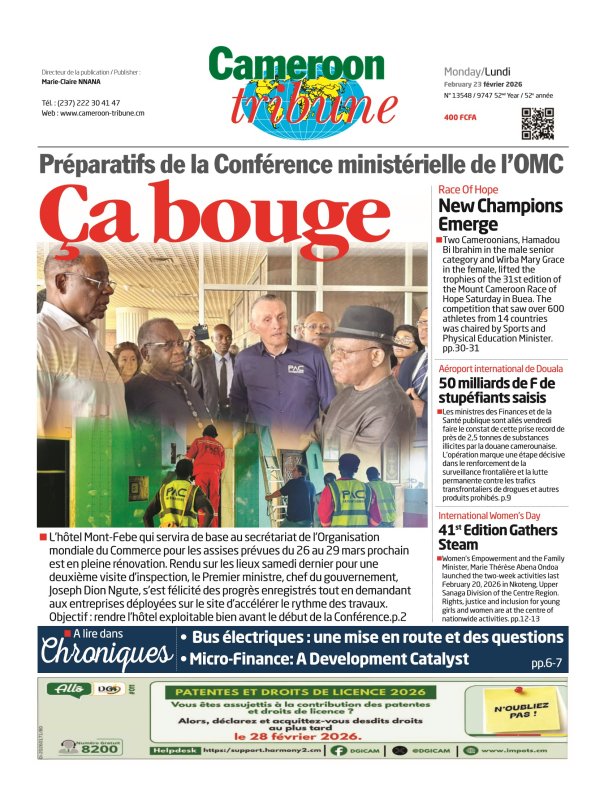The scramble over land by way of sale and grabbing is making news headlines in Cameroon. Fako Division in the South West Region has joined the spree of locales where the sale of land smacks of insatiable thirst. Lately, the University of Buea questioned the role of some chiefs in the mischief of land taking. Here, a bitter exchange of correspondences between the administration of the University and the traditional rulers of the area came to the limelight. While the University was backing the commonality of their land earlier earmarked for the public institution, the chiefs involved were asking to relinquish some land to boost their fiefdoms.
This is just one example of the many situations of land conflicts in Fako and across the country pitting communities against communities and individuals against individuals. Behind each of the land conflicts is usually some causal germ of the quest of private gain over public interest. The aggravating state of affairs necessitated the muscled hand of public authorities to put some form of order. This why a recent outing of Cameroon’s Minister of State Property, Surveys and Land Tenue (French acronym, MINDCAF) has suspended the sale of land in 21 of the country’s 58 administrative Divisions. The Ministerial act made public during a cabinet meeting of 28 April, 2022, is resounding and appears as a sign-post-check in a sector that remains central to the nation’s political, economic, cultural, and social life.
Land as the earth’s surface is, however, naturally infinite. Though not elastic, the earth will never be fully occupied. The added value of land only certainly comes with its locations. From this providence of nature, God has blessed the human being to take command and possession of the soil for exploitation and survival. Nonetheless, land meant to support life and as such a matter of collective and community interest, must be managed with law and order. This will check situations of disorder with land rather becoming a source of conflict, an object of envy and the individual enrichment tool. Even some public administrators of the public good have been wanting in their role. Some of the local Administrators as supposed public servants have gotten themselves entangled in land grabbing squabbles.
Amidst the hullabaloo over land grabbing in some areas of Cameroon, the Minister in charge has ordered the suspension of the sale of plots of land in areas of heightened disorder. The Ministerial Decision concerns Lekie, Mefou and Afamba, Mefou and Akono, Mbam and Inoubou, Mbam and Kim, Lom and Djerem, Dja and Lobo, Ntem Valley, Ocean, Mvila, Sanaga-Maritime, Moungo, Nkam, Upper Sanaga, Noun, Benue, Fako, Mezam, Mayo-Banyo, Vina, and Wouri. West of the Mungo, the decision touches on two Administrative Divisions out of 13 namely Mezam in the North West Region and Fako in the South West Region. Both localities are Divisional seats of their respective regional administrations.
The Ministerial stance comes as Government’s clench of fist against indiscriminate sale and occupancy of State and National Land. Regulatory instruments governing land ownership and disposal in Cameroon profiles acreage into such categories as State Land, National Land and Private Land. Land experts have defined public land as that which is used by the public. It is the stretch from the main road to the construction area. Public lands include markets, chiefdoms, and also the 25-meter stretch from the river or water body. Private lands are lands that have been duly acquired with known land title. Private lands could be individual or moral (land acquired by a company with a recognized land certificate).
National land is first of all land that is free for any occupation. National land can be classified in two categories namely land that has been occupied before 5 August, 1974, but has no land title. The second category is land occupied after 5 August, 1974, but has no land title. The date of 5 August, 1974, is the usual 30-day period of publication of a legal instrument, in this case, after the Ordinance No. 74/l of July 6, 1974, establishing the land tenure system in the Country.
Briefly, all free lands without land certificates belong to the State. Even when people ignorantly sell or buy national land, they are only occupying or exploiting it. Experts of the Ministry in charge of lands clarify that the Minister's decision is based on people’s constant abuse of public land depriving the community of its access. With the new dispensation, any one in need of a land certificate will henceforth have to obtain a special matriculation from MINDCAF before their files are processed.
Experts have analyzed this instrument and framed that the national domain is essentially made up of all unregistered land outside the public domain. They hold that the national domain is administered by the State. Its disposal can only be possible by concession or lease in the case of unoccupied land or by registration where occupation results in a clear human h...
Cet article complet est réservé aux abonnés
Déjà abonné ? Identifiez-vous >
Accédez en illimité à Cameroon Tribune Digital à partir de 26250 FCFA
Je M'abonne1 minute suffit pour vous abonner à Cameroon Tribune Digital !
- Votre numéro spécial cameroon-tribune en version numérique
- Des encarts
- Des appels d'offres exclusives
- D'avant-première (accès 24h avant la publication)
- Des éditions consultables sur tous supports (smartphone, tablettes, PC)











Commentaires